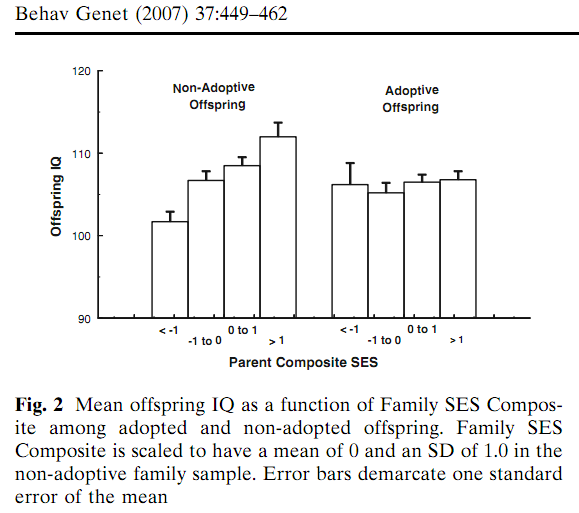IQ-wealth Correlation Weak for Adopted Children
Left: biological children; Right: adopted
X axis: wealth (socio-economic status). Y axis: child IQ. White adoptive and biological-child families, mix of asian and white adopted babies (4 mo. old) - I assume from outside the U.S. I also assume that the poorest families are actually not terribly poor (they’re rich enough to be qualified for this adoption agency). It’s tempting to say, under the assumption that people treat their adopted children the same as biological children, “IQ is mainly genetic, and good (bad) genes cause (after a few generations) high (low) wealth”, but I’m sure the prenatal (and first 4 months’) environment is an important cause as well, and you can imagine selection effects involving mothers who neither abort nor keep their child. The low-wealth families adopting children end up with smarter offspring than their non-adopting low-wealth counterparts and inversely for high-wealth (for the middle of the pack, there’s not much difference). I believe that nearly all the families (even the poorest) were sufficiently rich and nurturing after childbirth that the differences are due mostly to the quality of the baby. It could be that the poorest (wealthiest) non-adopting parents somehow provide an exceptionally poor (good) prenatal and first-4-months environment, but that’s odd considering the quality of post-4-months-care is identically sufficient. You would have to believe that prenatal sufficiency is a much higher bar - which is credible; fetal development is probably a delicate thing. If it’s not in the prenatal or first-4-months environment, it’s in the genes. That sucks (in terms of being able to hope for technological improvements allowing all to enjoy the priveleges of the rich, that aren’t eugenic), but appears to be true.I can’t say whether the genetic or prenatal quality of the adopted children is better or worse, but their combination seems similar to U.S. middle-class.
You can also consider adopted child trying hard enough to get Bs or As in school (harder than a biological child), or sibling competition effects.
